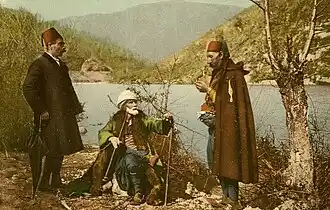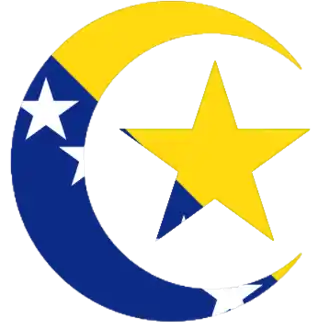
Bosnian surnames carry significant historical and cultural value as they reflect the personal and ancestral backgrounds of individuals. They serve as markers of identity and can provide insights into family history and lineage. The formation of surnames in Bosnia follows common patterns observed in other South Slavic regions, with an emphasis on first names, nicknames, occupations, and geographical locations. Family names are traditionally passed down the male line, and wives typically take their husband’s family name upon marriage. Some may add their husband’s family name to their own. Bosnian given names often reflect their ethnicity. For example, Bosniaks often may have a name with an Islamic or Turkish origin, such as Mustafagić (Mustafa).[1]
Bosniak originsBosniak origins

Bosniaks are a South Slavic nation and ethnic group originating from the historical region of Bosnia in southeastern Europe, which is now part of Bosnia and Herzegovina. A significant Bosniak minority resides in other Balkan countries, such as the Sandžak region of Serbia and Montenegro, where Bosniaks form a distinct regional presence. They are also present in Croatia and Kosovo. Bosniaks are commonly identified by their historical ties to the region of Bosnia, their adherence to Islam since the 15th and 16th centuries, and their unique culture and Bosnian language. The Bosnian language is influenced by Slavic, Turkish, and other linguistic elements.
Derivation of bosnian surnamesDerivation of bosnian surnames
Suffic -ićSuffic -ić
Bosnian surnames often display distinct characteristics that are typical among the South Slavs of former Yugoslavia. A common feature is the use of suffixes like "ić" or "ović" at the end of surnames, which primarily translates to "son" in English. This suffix serves a similar purpose to the "son" found in English surnames like Johnson or Wilson, indicating a family relationship. Understanding the elements preceding these suffixes can provide valuable insights into a specific family's history.
Origin of Bosnian surnamesOrigin of Bosnian surnames
Bosnian surnames of patronymic originBosnian surnames of patronymic origin
The majority of Bosnian surnames adhere to a well-established pattern that originated during the period when surnames were standardized in Bosnia and Herzegovina. In certain Bosnian Muslim surnames, the founder's name is followed by an Islamic profession or title, culminating with the suffix "ić". For instance, surnames like Izetbegović (son of Izet bey) and Hadžiosmanović (son of Osman Hadži) exemplify this pattern. Other variations include surnames that solely consist of the given name, such as Osmanović (son of Osman). These names are especially common among Bosniak Muslims, often reflecting Ottoman-Islamic roots.[2]
- Ibrahimović – “son of Ibrahim”
- Hasanović – “son of Hasan”
- Mehmedović – “son of Mehmed”
- Alić – “descendant of Ali”
- Jusufović – “son of Jusuf” (Joseph)
- Hodžić – “son of the hodža (imam)”
- Avdić – “son of Avdo” (Abdullah)
- Hamzić – “son of Hamza”
- Salihović – “son of Salih”
- Džaferović – “son of Džafer”
Bosnian surnames of religious originBosnian surnames of religious origin
There are surnames that denote a specific profession, e.g. Imamović (son of an imam). Some surnames even indicate religious affiliation, such as Muslimović, meaning "son of a Muslim."
The prevalence of the "ović" and "ić" endings commonly associated with Slavic surnames. These surnames likely have remained unchanged since medieval times and are often linked to the old Bosnian nobility or the last wave of individuals who converted to Islam. Examples of such surnames include Tvrtković and Kulenović.
Bosnian surnames of occupational originBosnian surnames of occupational origin
There are also Bosnian surnames that deviate from the "ić" pattern. These surnames typically derive from a family's place of origin, occupation, or other significant factors in their history. Many of these surnames reflect ancestral jobs, crafts, or clerical roles, especially in Ottoman or Austro-Hungarian contexts. For instance, surnames like:
- Zlatar (meaning "jeweler")
- Kovač (meaning "blacksmith")
- Kolar (meaning "wheelwright")
- Begić – from beg or bey (noble title)
- subašić – from subaša (Ottoman village elder)
- delibašić – from deli başı (head of cavalry unit)
- mlinarević – “miller’s son”
- Kovačević – “son of a blacksmith” (kovač)
- Stolar / Stolarić – “carpenter”
- Vojvodić – “descendant of a vojvoda” (warlord/military leader)
Bosnian surnames of descriptive originBosnian surnames of descriptive origin
Another intriguing aspect of Bosnian surnames is their association with animals. Some surnames are derived from the names of local animals, such as:
- Vuk (wolf)
- Medvjed (bear)
- Zec (rabbit)
- Crnkić – “dark one” (crn = black/dark)
- Bijedić – possibly “descendant of a poor one” (bijeda = poverty)
- Ljubović – “from love” (ljubav)
- Brkić – “moustache” (brk)
- Šehić – linked to šehid (martyr) or saintly lineage
- Zukić – diminutive of Zuka, likely nickname
- Pašić – “son of Pasha” or used ironically for nobility
- Ćatić – “scribe” (ćata)
- Smailagić – “descendant of Smail-aga,” often denoting prestige
- Sokolović – “descendant of a falcon” (sokol = falcon)
The animal-based surnames may have historical or symbolic significance, reflecting characteristics attributed to individuals or their ancestral lineages. Occasionally, more unusual animal names, like Majmun (monkey), have also been adopted as surnames, adding diversity and distinctiveness to the naming tradition.[3]
Bosnian surnames of toponymic originBosnian surnames of toponymic origin
Geographical origins also play a role in surname formation. Families who migrated from one place to another often adopted a surname that indicated their original place of residence. This allowed them to maintain a connection to their ancestral home while distinguishing themselves from the local population in their new location. Thus, surnames like Trebinjac (meaning someone from Trebinje) serve as reminders of familial heritage and migration history, like the following:
- Sarajlić – “from Sarajevo”
- Mostarac / Mostarić – “from Mostar”
- Travnički – “from Travnik”
- Tuzlić – “from Tuzla”
- Banović – from Banovići or possibly “son of a ban” (ruler)
- Nevesinjac – “from Nevesinje”
- Bijelić – “from Bijeljina”
- Goraždanin – “person from Goražde”
- Bosnić – “Bosnian” (generic, pan-regional)
- Krajišnik – “from the Krajina” (borderland)
Bosnian surnames of foreign originBosnian surnames of foreign origin

Certain Bosnian surnames indicate foreign origins, suggesting that the family's founder came from outside of Bosnia and Herzegovina. These surnames often have Albanian, Turkish, or Arabic roots. Examples include:
- Arnautović (derived from "Arnaute," a Turkish term for Albanians)
- Vlasić (derived from the Vlach people)
- Tatarović (derived from the Tatar people)
- Arapović (derived from "Arap," a Turkish term for Arabs)
Additionally, there are surnames believed to have Proto-Slavic origins, and some may even have Illyrian or Celtic roots, such as the surnames Mataruga and Motoruga. Many Bosnian surnames are also shared by Croatian and Serbian communities, illustrating the interconnectedness and common historical roots of these cultures, such as the following:
These surnames are prevalent across Croatian and Serbian regions.
Bosnian surnames of noble and aristocratic originBosnian surnames of noble and aristocratic origin
These surnames belonged to notable Bosnian Muslim families, Ottoman administrators, or medieval nobility.
- Sokolović – powerful Ottoman dynasty (e.g., Grand Vizier Mehmed Pasha Sokolović)
- Gradaščević – noble Bosniak family from Gradačac
- Bosnić – used historically by noble lineages as well as commoners
- Ćemalović – possible bey lineage
- Bešlagić – “descendant of Bešlaga,” high-status title
- Osmanagić – from Osman + aga (ruler lineage)
- Alihodžić – “descendant of Ali the hodža”
- Čengić – noble family from Herzegovina
- Hajdarević – linked to the name Hajdar, a strong Islamic name
- Hadžihalilović – “descendant of Hajji Halil,” denoting both piety and status
Most common Bosnian surnamesMost common Bosnian surnames
Celebrities with bosnian surnamesCelebrities with bosnian surnames

- Goran Bregović - Bosnian musician
- Dino Merlin , born Edin Dervišhalidović - Bosnian singer
- Franjo AKA "Braco Singer" Klindic Bosnian Bosnian singer
- Eva von Berne Bosnian actress,
- Zlatan Ibrahimović, Swedish footballer
- Emir Kusturica, Serbian film director
- Edham Nurredin "Ed" Husić, Australian politician
- Irfan Škiljan, Bosnian-Austrian computer scientist, developer of IrfanView
See alsoSee also
- Most common Bosnian surnames
- Bosnia and Herzegovina
- Bosnian Genocide
- Bosnia and Herzegovina
- Yugoslavia
- Slavic surnames
- Serbia
- Serbian surnames
- Serbian Jewish surnames
- Croatian surnames
- Balkan ethnicity
- Macedonian surnames
- Bosnian Jewish surnames
- Albanian surnames
- Slovene surnames
- Bulgarian surnames
- Montenegrin surnames
Explore more about Bosnian surnamesExplore more about Bosnian surnames
- Bosnia and Herzegowina family research at MyHeritage record collection.
- Ethnicity map of Bosnia and Herezegowina on the MyHeritage knowledge base.


